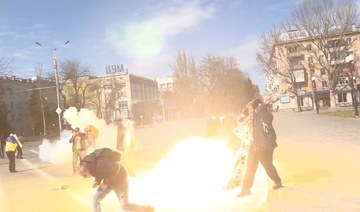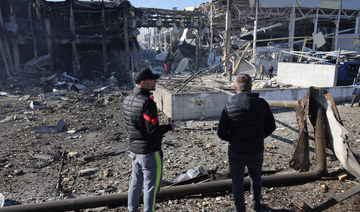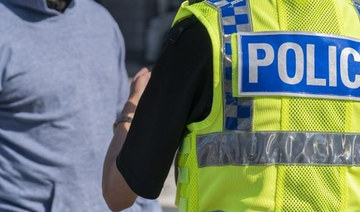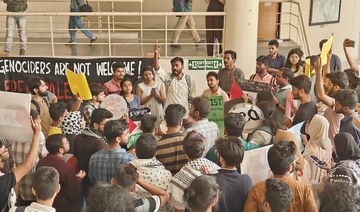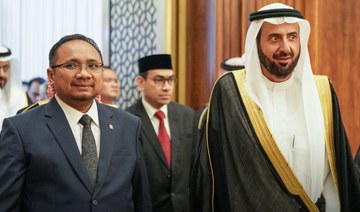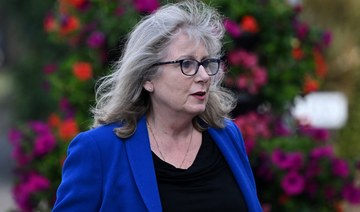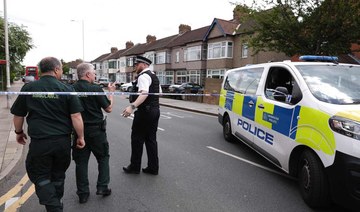ZAPORIZHZHIA: Ukraine offered to release Russian prisoners of war in exchange for the safe evacuation of the badly injured fighters trapped inside a steel mill in the ruined city of Mariupol, as Kyiv began preparing for its first war crimes trial of a captured Russian soldier.
While fighting raged in Ukraine’s east and south, Ukrainian Deputy Prime Minister Iryna Vereshchuk said Wednesday that negotiations were underway to release the injured fighters who are holed up in the last bastion of Ukrainian resistance in Mariupol. She said there were different options, but “none of them is ideal.”
Ukraine also shut down a pipeline that carries Russian gas to Western Europe, and a Kremlin-installed politician in the southern Kherson region said officials there want Russian President Vladimir Putin to annex it.
That was something at least one resident contested: “All people in Kherson are waiting for our troops to come as soon as possible,” said a teacher who gave only her first name, Olga, out of fear of retaliation. “Nobody wants to live in Russia or join Russia.”
Ukraine’s top prosecutor said her office charged Russian Sgt. Vadin Shyshimarin, 21, in the killing of an unarmed 62-year-old civilian who was gunned down while riding a bicycle in February, four days into the war. Shyshimarin, who served with a tank unit, was accused of firing through a car window on the man in the northeastern village of Chupakhivka.
Prosecutor General Iryna Venediktova said the soldier could get up to 15 years in prison. She did not say when his trial would start. Venediktova’s office has said it has been investigating more than 10,700 allegations of war crimes committed by Russian forces and has identified over 600 suspects.
Many of the atrocities came to light last month after Moscow’s forces aborted their bid to capture Kyiv and withdrew from around the capital, exposing mass graves and streets and yards strewn with bodies in towns such as Bucha. Residents told of killings, burnings, rape, torture and dismemberment.
Volodymyr Yavorskyy of the Center for Civil Liberties said the Ukrainian human rights group will be closely following Shyshimarin’s trial to see if it is fair. “It’s very difficult to observe all the rules, norms and neutrality of the court proceedings in wartime,” he said.
On the economic front, Ukraine shut down a pipeline that carries Russian gas across Ukraine to homes and industries in Western Europe, marking the first time since the start of the war that Kyiv disrupted the westward flow of one of Moscow’s most lucrative exports.
The move was made, Ukraine’s natural gas pipeline operator said, to stop Russian gas flowing through a station in part of eastern Ukraine controlled by Moscow-backed separatists because enemy forces were interfering with the station’s operation and siphoning gas.
The immediate effect is likely to be limited, in part because Russia can divert the gas to another pipeline and because Europe relies on a variety of suppliers. Still, the cutoff underscored the broader risk to gas supplies from the war.
In the southern Kherson region, site of the first major Ukrainian city to fall in the war, a Moscow-appointed leader said officials there want Russian President Vladimir Putin to annex the area. Kirill Stremousov, deputy head of the Kherson regional administration appointed by Moscow, told Russia’s RIA Novosti news agency: “The city of Kherson is Russia.”
That raised the possibility that the Kremlin would seek to break off another piece of Ukraine as it tries to salvage an invasion gone awry. Russia annexed Ukraine’s Crimean Peninsula, which borders the Kherson region, after a disputed referendum in 2014, a move denounced as illegal and rejected by most of the international community.
Inside Kherson, people have taken to the streets to decry the Russian occupation. Olga, the teacher, said such protests are impossible now because Moscow’s troops “kidnapped activists and citizens simply for wearing Ukrainian colors or ribbons.” She said “people are scared of talking openly outside their homes” and “everyone walks on the street quickly.”
A Black Sea port of roughly 300,000, Kherson provides Crimea with access to fresh water and is seen as a gateway to wider Russian control over southern Ukraine.
Kremlin spokesman Dmitry Peskov said it would be up to residents in the region to decide whether an appeal to annex should be made. He said any move to annex territory would have to be closely evaluated by legal experts to make sure it is “absolutely legitimate, as it was with Crimea.”
Ukrainian presidential adviser Mykhailo Podolyak tweeted: “The invaders may ask to join even Mars or Jupiter. The Ukrainian army will liberate Kherson, no matter what games with words they play.”
On the battlefield, Ukrainian officials said a Russian rocket attack targeted an area around Zaporizhzhia, destroying unspecified infrastructure. There were no immediate reports of casualties. The southeastern city has been a refuge for civilians fleeing the devastated port city of Mariupol.
Russian forces continued to pound the steel plant in Mariupol, its defenders said. The Azov Regiment said on social media that Russian forces carried out 38 airstrikes in the previous 24 hours on the grounds of the Azovstal steelworks.
The plant has sheltered hundreds of Ukrainian troops and civilians during a monthslong siege.
An adviser to the Mariupol mayor said Russian forces have blocked all evacuation routes out of the city. Petro Andriushchenko said there are few apartment buildings fit to live in and little food or drinking water. He said some remaining residents are cooperating with occupying Russian forces in exchange for food.
Ukraine, meanwhile, was targeting Russian air defenses and resupply vessels on Snake Island in the Black Sea in an effort to disrupt Moscow’s efforts to expand its control over the coastline, according to the British Ministry of Defense.
Ukraine said it also shot down a cruise missile targeting the Black Sea port city of Odesa.
Elsewhere, the governor of a Russian region near Ukraine said at least one civilian was killed and six wounded by Ukrainian shelling in the village of Solokhi, near the border. Belgorod Gov. Vyacheslav Gladkov’s account couldn’t be independently verified, but he said the village will be evacuated.
Ukraine offers to swap prisoners for hurt Mariupol fighters
https://arab.news/jgnvz
Ukraine offers to swap prisoners for hurt Mariupol fighters
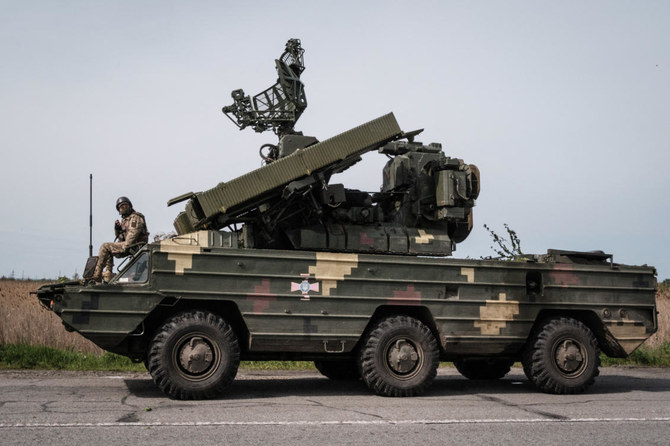
- The plant has sheltered hundreds of Ukrainian troops and civilians during a monthslong siege
British police officer pleads guilty to terror charges for showing support for Hamas
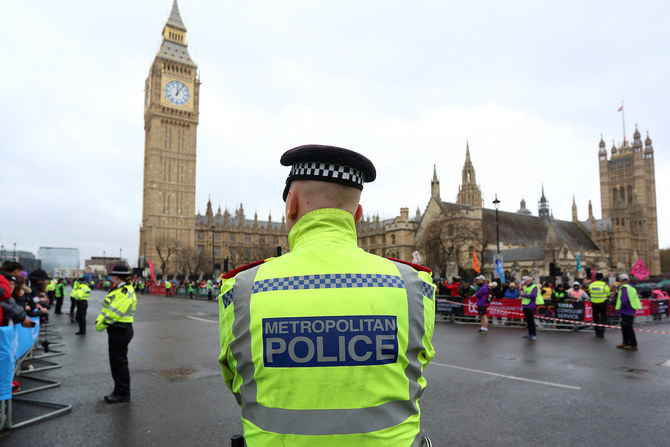
- Adil pleaded guilty in Westminster Magistrates’ Court to two counts of publishing an image in support of a proscribed organization in violation of the Terrorism Act
- Two other police officers who were concerned by the images reported Adil to superiors
LONDON: A British police officer pleaded guilty Thursday to terror charges for showing support on social media for Hamas, which is designated a terror group and banned in the UK
West Yorkshire constable Mohammed Adil admitted sharing two images on WhatsApp supporting the group three weeks after Hamas and other Palestinian militants stormed into Israel on Oct. 7 and killed about 1,200 people and seized some 250 hostages.
Adil, 26, pleaded guilty in Westminster Magistrates’ Court to two counts of publishing an image in support of a proscribed organization in violation of the Terrorism Act.
In messages shared on WhatsApp stories with nearly 1,100 contacts, Adil posted images of a fighter wearing a Hamas headband, prosecutor Bridget Fitzpatrick said.
“Today is the time for the Palestinian people to rise, set their paths straight and establish an independent Palestinian state,” an Oct. 31 post said, apparently quoting the leader of Hamas’ military wing.
A second post on Nov. 4 was said to quote a Hamas military spokesperson.
Two other police officers who were concerned by the images reported Adil to superiors, Fitzpatrick said. He was arrested in November and has been suspended from the force.
“I accept that at the time of the offending you were of good character,” Chief magistrate Paul Goldspring told Adil, though he said he may impose a prison term when he is sentenced June 4.
Adil was released on bail.
California police move in to dismantle pro-Palestinian protest camp at UCLA

- The pre-dawn police crackdown at UCLA marked the latest flashpoint for mounting tensions on US college campuses
- Live TV footage showed about six protesters under arrest
LOS ANGELES: Hundreds of helmeted police muscled their way into a central plaza of the University of California at Los Angeles early on Thursday to dismantle a pro-Palestinian protest camp attacked the previous night by pro-Israel supporters.
The pre-dawn police crackdown at UCLA marked the latest flashpoint for mounting tensions on US college campuses, where protests over Israel’s conduct of the war in Gaza have led to student clashes with each other and law enforcement.
Live TV footage showed about six protesters under arrest, kneeling on the ground, their hands bound behind their backs with zip-ties.
Dozens of loud explosions were heard during the clash from flash-bang charges, or stun grenades, fired by police.
Demonstrators, some carrying makeshift shields and umbrellas, sought to block the officers’ advance by their sheer numbers, while shouting, “push them back” and flashing bright lights in the eyes of the police. Others on the opposite side of the camp gave up quickly, and were seen walking away with their hands over their heads under police escort.
Around sunset on Wednesday, officers in tactical gear had begun filing onto the UCLA campus and taking up positions adjacent to a complex of tents occupied by throngs of demonstrators, live footage from the scene showed.
Local television station KABC-TV estimated 300 to 500 protesters were hunkered down inside the camp, while around 2,000 more had gathered outside the barricades in support.
But the assembled police stood by on the periphery for hours before finally starting to force their way into the encampment around 3:15 a.m. PDT (1015 GMT), tearing down barricades and arresting occupants who refused to leave. The raid was led by a phalanx of California Highway Patrol officers carrying shields and batons.
Some of the protesters had been seen donning hard hats, goggles and respirator masks in anticipation of the siege a day after the university declared the encampment unlawful.
Prior to moving in, police urged demonstrators in repeated loudspeaker announcements to clear the protest zone, which occupied a plaza about the size of a football field between the landmark twin-tower auditorium Royce Hall and the main undergraduate library.
An initial group of Los Angeles police officers who briefly entered a corner of the camp were overwhelmed by demonstrators and forced to retreat, before reinforcements arrived by the busload about an hour later.
Violent clash precedes crackdown
UCLA had canceled classes for the day on Wednesday following a violent clash between the encampment’s occupants and a group of masked counter-demonstrators who mounted a surprise assault late Tuesday night on the tent city.
The occupants of the outdoor protest camp, set up last week, had remained mostly peaceful before the melee, in which both sides traded blows and doused each other with pepper spray.
Members of the pro-Palestinian group said fireworks were thrown at them and they were beaten with bats and sticks. University officials blamed the disturbance on “instigators” and vowed an investigation.
The confrontation went on for two or three hours into early Wednesday morning before police restored order. A spokesperson for California Governor Gavin Newsom later criticized the “limited and delayed campus law enforcement response” to the unrest as “unacceptable.”
As the much-expanded police force entered the campus on Wednesday night to clear the encampment, some of the protesters were heard yelling at them, “Where were you yesterday?“
Taylor Gee, a 30-year old pro-Palestinian protester and UCLA law student, said the police action felt “especially galling” to many protesters given the slow police response a night earlier.
“For them to come out the next night to remove us from the encampment, it doesn’t make any sense, but it also makes all the sense in the world.”
Protests at schools across the US
UCLA officials said the campus, which enrolls nearly 52,000 students, including undergraduates and graduate scholars, would remain shuttered except for limited operations on Thursday and Friday.
The protests follow the Oct. 7 attack on southern Israel by Hamas militants from the Gaza Strip and the ensuing Israeli offensive on the Palestinian enclave.
Students have rallied or set up tent encampments at dozens of schools across the US in recent days, calling for an immediate ceasefire in Gaza and demanding schools divest from companies that support Israel’s government. Many of the schools have called in police to quell the protests.
The demonstrations across the country have been met with counter-protesters accusing them of fomenting anti-Jewish hatred. The pro-Palestinian side, including Jews opposed to Israeli actions in Gaza, say they are being unfairly branded as antisemitic for criticizing Israel’s government and expressing support for human rights.
The issue has taken on political overtones in the run-up to the US presidential election in November, with Republicans accusing some university administrators of turning a blind eye to antisemitic rhetoric and harassment.
Wednesday night’s police action came a day after police in New York City arrested pro-Palestinian activists who occupied a building at Columbia University and removed a tent city from the campus of the Ivy League school.
Police arrested a total of about 300 people at Columbia and City College of New York, Mayor Eric Adams said. Many of those arrested were charged with trespassing and criminal mischief.
The clashes at UCLA and in New York were part of the biggest outpouring of US student activism since the anti-racism rallies and marches of 2020.
Ninety pro-Palestinian demonstrators — students and outsiders — were arrested at Dartmouth University in New Hampshire on Wednesday, the Hanover Police Department said. They were charged with criminal trespass and resisting arrest.
Indonesia explores opportunities in Suez Canal Economic Zone

- Egypt is Indonesia’s top trade partner in the North African region
- Indonesia has lately been increasing trade engagement with Egypt
JAKARTA: Indonesia is setting its sights on cooperation with the Suez Canal Economic Zone, authorities have said after a series of ministerial-level meetings in Cairo this week.
An Indonesian delegation led by Deputy Trade Minister Jerry Sambuaga met with officials from the Suez Canal Economic Zone on Sunday to explore opportunities, as Jakarta seeks to boost exports through the vital waterway that is the shortest route between Asia and Europe.
Closer cooperation with the Suez Canal Economic Zone would help Indonesia boost its exports to Egypt, as well as other parts of Africa, the Middle East, Europe and Central Asia, Sambuaga said.
“This is in keeping with the fact that more than 8 percent of global trade goes through the Suez Canal annually … We hope that in the future, Indonesia and Egypt will have stronger cooperation and we will see an increase in the export of Indonesian goods to Egypt,” the minister added.
Southeast Asia’s biggest economy has been increasing its trade engagement with Egypt, which it sees as a gateway for exports to other African countries.
Sambuaga’s trip to Cairo followed the visit of Trade Minister Zulkifli Hasan just last year, when he signed a memorandum of understanding with Egyptian Minister of Trade and Industry Ahmed Samir to form a joint trade committee to boost commercial relations.
Earlier in March, Indonesia worked alongside Malaysia to explore the possibilities of a free trade pact between the Association of Southeast Asian Nations and Egypt.
Egypt ranks third among Indonesia’s top export destinations in the Middle East and North Africa, just after the UAE and Saudi Arabia.
With bilateral trade volume worth around $1.58 billion in 2023, Egypt is Indonesia’s top trade partner in North Africa alone. Palm oil, coffee beans, and coconut oil are some of Indonesia’s main exports to Egypt.
India, UAE mark two years of free trade with 16% growth
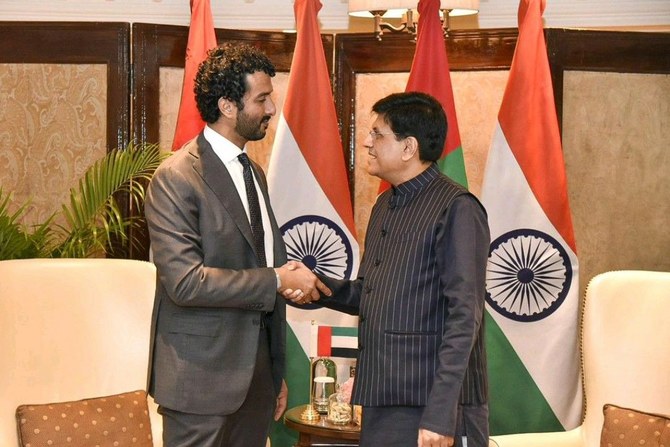
- Technology, innovation, and energy are main drivers behind the growth
- UAE ambassador welcomes increase in trade as ‘resounding success story’
NEW DELHI: A broad trade and investment pact signed by India and the UAE two years ago has boosted bilateral trade by 16 percent, with India’s top business body seeing growth, especially in the innovation, energy and technology sectors.
The Comprehensive Economic Partnership Agreement was signed by India’s Commerce and Industry Minister Piyush Goyal and UAE Economy Minister Abdulla bin Touq Al-Marri in February 2022.
It has been in effect since May 1, 2022, reducing tariffs on about 80 percent of all goods and providing zero-duty access to 90 percent of Indian exports.
The pact has since significantly advanced bilateral exchanges, as they registered a year-on-year increase of more than 16 percent, according to data from the Federation of Indian Chambers of Commerce and Industry, India’s largest and oldest trade association.
“In the first two years of CEPA’s operation, trade between the two countries has grown remarkably by 16.41 percent, showing an increase of total trade from $72.87 billion in 2021-2022 to $84.84 billion in 2022-2023,” FICCI Secretary-General S.K. Pathak told Arab News.
“Most of this growth has been registered in energy, infrastructure and construction, technology and innovation, pharma and healthcare, tourism and cultural exchanges.”
The agreement made the UAE emerge as India’s key partner in the Gulf Cooperation Council region, with both countries expecting to increase the total value of bilateral trade in non-petroleum products to over $100 billion and trade in services to $15 billion by 2030.
Citing the “growing importance of the trade relations between the two countries,” Pathak said the FICCI had “set up an office in Dubai to work closely with industry and government and support business to achieve the full benefits of CEPA.”
Supported by the UAE and Indian governments, the UAE-India CEPA Council was also established earlier this year to enhance investment, trade ties, and the implementation of the pact’s rules.
The UAE Embassy in India celebrated the second anniversary of the agreement with members of the business community in Mumbai, India’s financial hub.
UAE Ambassador Abdulnasser Al-Shaali welcomed the growth in bilateral commercial exchanges as a “resounding success story,” solidifying the long-standing economic ties between the two countries.
“Over the past two years, we have witnessed remarkable growth in bilateral trade, a testament to the immense potential that exists when our complementary strengths are harnessed effectively,” he said during the event on Wednesday.
“The CEPA has not only opened new avenues for businesses to benefit from the bilateral partnership but has also fostered deeper integration of our economies, paving the way for increased investment flows and collaboration across diverse sectors.”
London mayor accuses MP of ‘Islamophobia and anti-Muslim hatred’

- Lee Anderson recorded claiming Sadiq Khan ‘hates this country ... our heritage, our culture’
- Anderson claims he received support from Cabinet ministers after saying Khan controlled by ‘Islamists’
LONDON: The “Islamophobia and anti-Muslim hatred” of Reform UK MP Lee Anderson is “fuelling hate crime and violent threats,” London Mayor Sadiq Khan has said in a statement.
His comments come after ITV News released a secret recording of Anderson talking to party members at an event in which he claimed Khan “hates this country ... our heritage, our culture.”
The news also follows revelations ahead of the London mayoral elections on Thursday that Conservative candidate Susan Hall has followed social media pages and groups in which other people allegedly posted racist content and abuse aimed at the Muslim mayor.
Anderson was previously deputy chair of the Conservatives, but switched parties after he was suspended by Prime Minister Rishi Sunak for claiming that Khan was under the control of “Islamists” and had “given our capital city away to his mates.”
In the ITV recording, Anderson is heard saying former Conservative colleagues had offered him support and sympathy for his words, saying senior party officials had told him “you’re saying what millions of people are thinking up and down the country.”
While not naming anyone specifically, Anderson said: “At least two Cabinet ministers contacted me to say I’d been treated poorly.”
He added: “I would never betray the confidence of my colleagues, regardless of what political party they’re in, that was sent in confidence. A lot of those people who I sit opposite are still my friends.”
Khan said: “In the past 24 hours we have seen my Tory (Conservative) mayoral opponent endorsing Facebook groups rife with antisemitism, Islamophobia and death threats against me. And now we have a former Tory party deputy chair caught on camera being racist.
“It is deeply depressing that he confirms his Islamophobia and anti-Muslim hatred was cheered on by current Tory party staff, MPs and Cabinet ministers.”
Khan added: “It’s unpatriotic to talk down modern, diverse, brilliant Britain in this way. And it has real-world consequences, fuelling hate crime and violent threats.”



